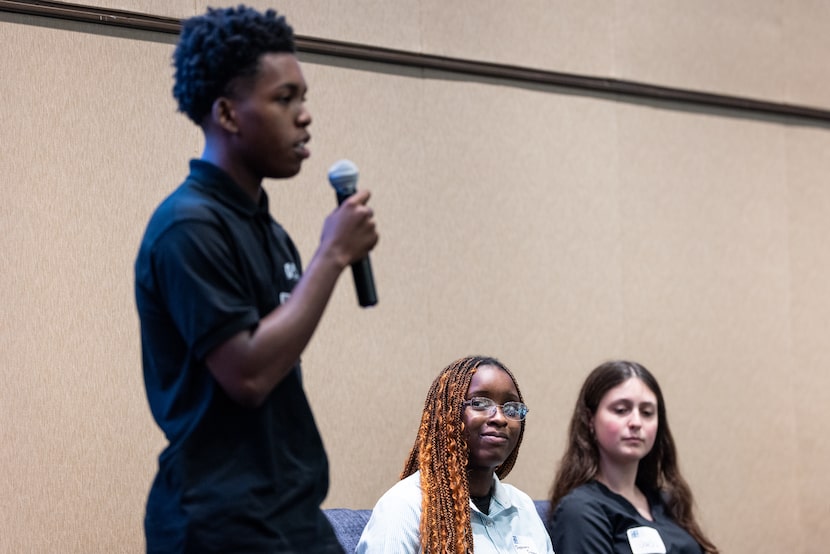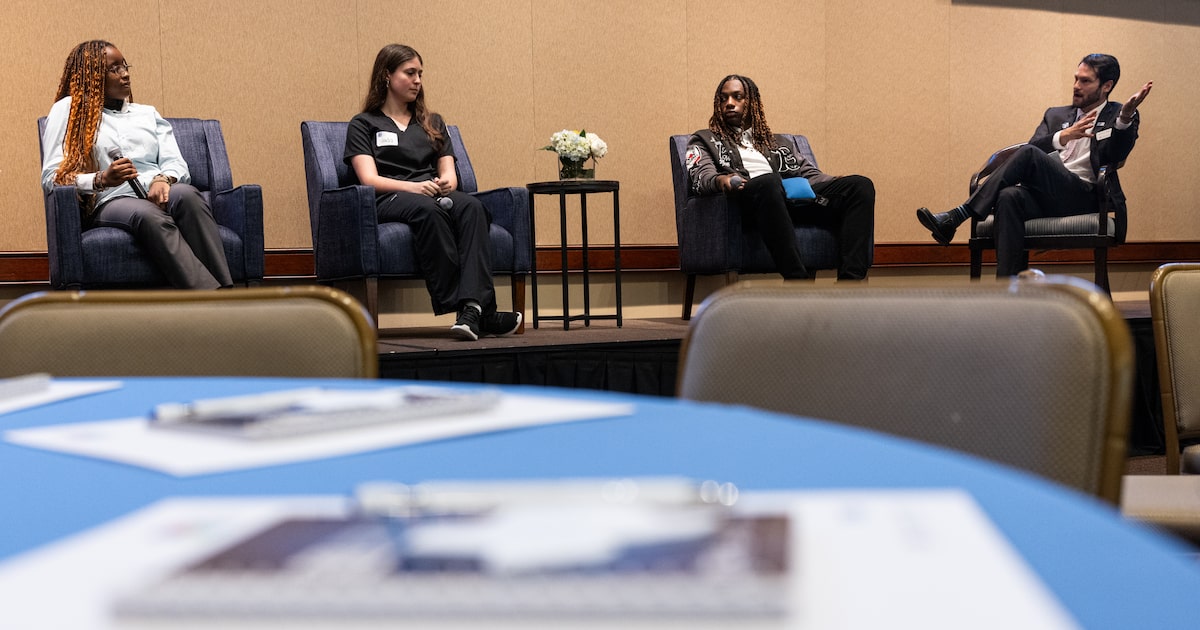Dallas is a national leader for its strong business climate. But workforce development advocates say more needs to be done to lift residents out of poverty.
The Communities Foundation of Texas recently hosted an event highlighting workforce challenges and solutions in one of the state’s largest regions, as Texas boasts the world’s eighth-largest economy.
Only 32% of Dallas County residents ages 25-34 earned an annual living wage of $60,651 in 2023, according to the Commit Partnership. (The Communities Foundation and Commit are supporters of the Future of North Texas initiative at The Dallas Morning News.)
Here are some key takeaways on Dallas’ workforce dilemma.
The Education Lab
Homegrown potential
Lynn McBee, president and CEO of Young Women’s Preparatory Network and Dallas’ workforce czar, is welcomed on stage during an event hosted by Educate Texas at Communities Foundation of Texas on Tuesday, Aug. 26, 2025 in Dallas.
Angela Piazza / Staff Photographer
Although people move to Dallas for job opportunities, the “sobering” reality is that four out of 10 Dallas adults are low-income, said Lynn McBee, the city’s workforce development czar.
Many of these adults work multiple jobs, but struggle to cover basic living expenses, she said.
“This isn’t about a lack of work ethic,” McBee said. “The problem is that until recently, our systems have not been designed to meet people where they are and to anticipate and remove the barriers that stand in the way of success.”
Child care, transportation and housing
Those barriers include a lack of affordable child care, limited transportation options and housing instability, McBee said.
Without accessible child care, it’s hard for parents to take classes or training that could lead to better jobs, McBee said. Limited transportation cuts people off from job sites, training centers and schools that could prepare residents for the workforce, she said.
Furthermore, “when families are moving from place to place, education takes a backseat to survival,” McBee said.
Broken education pipeline
For many residents, the education-to-career pipeline is broken or was never fully built, McBee said.
High schools need to commit to college training or industry credential programs designed to prevent young people from dropping out or graduating from school only to obtain low wage jobs with no upward mobility, she said.

Sabrina Hodge (left), executive director of student leadership and success at the University of North Texas at Dallas, listens to Fallan Frank, deputy director of higher education and workforce at Educate Texas, speak during a panel at an event hosted by Educate Texas at Communities Foundation of Texas on Tuesday, Aug. 26, 2025 in Dallas.
Angela Piazza / Staff Photographer
Schools need to provide students access to career exploration opportunities as early as elementary school, said Fallan Frank, deputy director of higher education and workforce at Educate Texas, an initiative of Communities Foundation of Texas.
That matters partly because students don’t know what opportunities exist. “Before high school, I never even thought about my future. I kind of just figured I would go wherever the wind takes me,” said Elijah Armstrong, a student at Juan Seguin High School in Arlington.
The 16-year-old junior said he’s now dual-enrolled at Tarrant County College and seeking an engineering career.
Schools also need to promote internship opportunities for students to identify interests in high-demand fields, especially in jobs that may only require industry certifications instead of four-year degrees, workforce advocates said.

Elijah Armstrong, of Juan Seguin High School and Tarrant County College, speaks during a student and alumni panel at an event hosted by Educate Texas at Communities Foundation of Texas on Tuesday, Aug. 26, 2025 in Dallas.
Angela Piazza / Staff Photographer
J. Maria Martineau, assistant vice president of community engagement at Medical City Healthcare, said workforce shortages across various industries are due partly to an aging workforce and retirements.
“The individuals that are coming behind them may not necessarily have the experience necessary but through programs like P-TECH, they can gain the skills they need through hands-on learning at an earlier age,” she told The News.
Economic urgency
Bolstering outcomes among Dallas natives is crucial as more people move into North Texas, workforce development advocates said.
Dallas historically relied on importing talent for high-demand fields such as teaching, health care, manufacturing and STEM, largely because the region was affordable, said Jarrad Toussant, senior vice president of education and workforce at the Dallas Regional Chamber. (The DRC is a supporter of the Future of North Texas initiative at The News.)
But as costs rise, that strategy is becoming unsustainable, he said. Meanwhile, the region educates over a million students, but fails to connect them to the highest-skill, highest-paying jobs, he said. Instead, locals end up working in retail, food service and the government, which on average pay below the cost of living, he said.

Elijah Armstrong, of Juan Seguin High School and Tarrant County College, speaks during a student and alumni panel at an event hosted by Educate Texas at Communities Foundation of Texas on Tuesday, Aug. 26, 2025 in Dallas. Additional panelists Stephanie Chiamaka Moseri (center) and Jaida Nava listen.
Angela Piazza / Staff Photographer
“Therein lies one of our most major challenges that we’re facing,” Toussant said. “We are trying for the first time to build a concerted talent pipeline through our K-12 and higher education system that leads directly to high-wage employment in our high-demand industries.”
This reporting is part of the Future of North Texas, a community-funded journalism initiative supported by the Commit Partnership, Communities Foundation of Texas, The Dallas Foundation, the Dallas Mavericks, the Dallas Regional Chamber, Deedie Rose, Lisa and Charles Siegel, the McCune-Losinger Family Fund, The Meadows Foundation, the Perot Foundation, the United Way of Metropolitan Dallas and the University of Texas at Dallas. The News retains full editorial control of this coverage.
